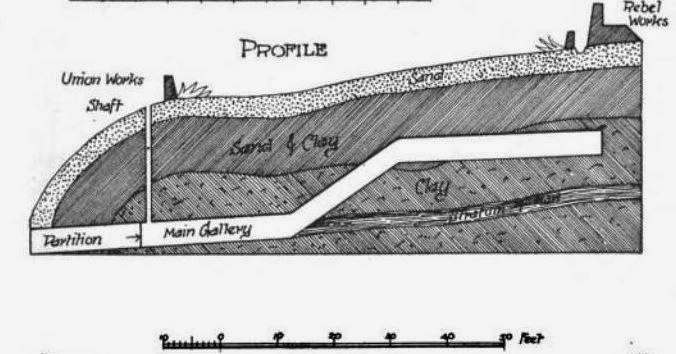I feel that this small contribution the the items of the war of 1861-65 is quite inadequate to do justice to so important a subject: but I trust that it will give to my Confederate friends some idea of the wonderful work done before Petersburg on that memorable occasion.
The mine was successfully exploded on July 30, 1864, but the conflict after this was a dreadful defeat for our army- no blame to us of the 48th; we did our work O. K. Had Meade, sent in the men at once after the explosion, Petersburg must have fallen; but he waited for half an hour under a bombardment till the Confederates were prepared for an assault, and all was confusion.
It will be remembered by my friends of the Southern army that the explosion did not eventuate at the time expected, as every obstacle-that could be thrown in our way by the higher authorities was done. We actually began the mine and it was well under way before the commanding officers knew anything about it. When we began to run the fuse from the entrance to the magazines where the powder was stored, the stuff was given us in small lengths, the longest about twenty feet. Of course we had then to splice the fuses four parallel lengths, and one of the splices failed about a hundred and thirty feet from the entrance. Knowing that a new splice was imperative, volunteers to enter the drift, renew the splice, light it, and lie down to die when called for. Crowded around the entrance when our men. Every one rushed to the opening when Plasants called for some one to do the work of death. The two nearest the opening were Sergt. Harry Reese ami Lieut. Jacob Douty, and they flew to the job and the rest were held back. These gallant heroes found the defect, renewed the error, lit the fine, and sat down to perish in the tunnel; but the others called to them to try an escape, and they just got out when the powder went up in a blaze of dazzling light. The growing sunrise was blackened by the mass of earth thrown up amid the smoke, and the trembling ground shook for miles around in the awful cataclysm. Congress gave to these gallant boys the "Medal of Honor," and their names will go down to glory till the history of war will die. I am told that in Petersburg the men of the Confederate army speak of these heroes often in their sessions.
When the tunnel had reached a point just beneath the Confederate lines, we projected the "laterals" at about right angles on either side of the drift, and in these laterals were placed the magazines containing the powder. These were square chambers of eight by ten feet, six on each side. The powder was principally in small kegs; but a quantity of ammunition from batteries was also added, and the fuses were run inside the duct formerly employed to carry the ventilating air from the outside fireplace to the breast of the tunnel. The last hundred and fifty feet of the duct was filled with loose powder together with the fuses; and when the fire reached the powder thus lying in the tube, of course the flame ran quickly to the magazines. The point where the fuses failed was within a hundred feet of the beginning point of the loose powder; hence it will be seen what a risk the two brave men ran in entering the mine to relight the failing fuses. The crater formed by the explosion was one hundred and eighty feet long, thirty deep, and from fifty to eighty wide. The noise of the rising and falling mass was heard ten miles away, and the earth tremor was distinctly felt twenty-nine miles distant, according to a report made to me.
Thank God for the fraternity which thus distinguishes real soldiers, though they fought bitterly against each other in the long ago! To me it is a thought of great pride that through my mother's side I am related to the two grand soldiers of the Southland — Stonewall Jackson and John B. Gordon. I also had a cousin in the Confederate army. For many years before it came to pass I did my best to cement a bond of friendship between the Confederate Veterans and the Grand Army of the Republic, in which I have the honor to be a Past Post Commander and the Past Medical Director. God grant that the gallant men of your sunny South who fought so gloriously and grandly against almost overwhelming difficulties may be held in highest esteem, and that all of us on either side may never be forgotten by our descendants as men who fought as their convictions led them to do in defense of their fair land! I feel it an honor beyond description to be asked to give in my humble and altogether unworthy manner anything that can unite in bonds of fraternity and sympathy the men of the Confederate and Federal armies. Let me assure you, my dear friends, that nobody holds in higher respect the fame and name of the men of the Confederate army.
-Confederate Veteran
September 1909
Diagrams from The 48th in the war: Being a narrative of the campaigns of the 48th regiment, infantry, Pennsylvania veteran volunteers, during the war of the rebellion by Oliver Christian Bosbyshell, 1895



No comments:
Post a Comment